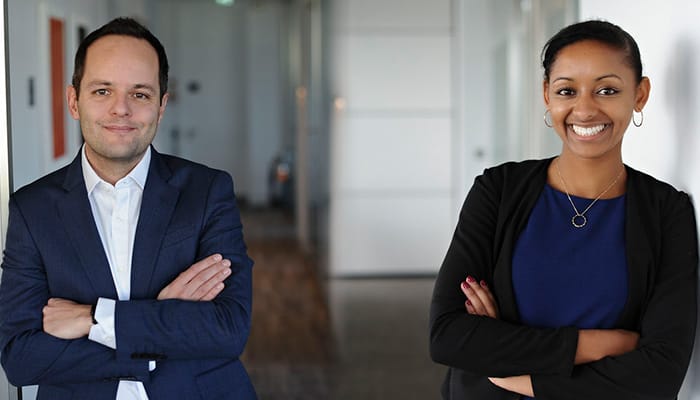George Weavil, private equity and financial sponsors partner and Raphaella Gabrasadig, associate in the private equity and financial sponsors team at Travers Smith give insight into how the increased focus on sustainable business is changing their practice area and share their advice for those looking to enter the profession

With environmental, social and governance (ESG) considerations high on the agenda for businesses, Legal Cheek Careers caught up with George Weavil and Raphaella Gabrasadig from Travers Smith’s private equity and financial sponsors team, to discuss the part played by ESG in their line of work.
Is this a busy period for you as a private equity lawyer?
George: In the immediate aftermath of the emergence of the pandemic, many private equity funds chose to focus on their portfolio rather than pursuing new acquisitions or exiting existing investments. Since the summer, however, transactional activity has intensified. Undoubtably, the arrival on the scene of multiple vaccines has boosted investors’ confidence and their ability to “price in” the impact of the pandemic on specific businesses now that there is an endpoint in sight. An anticipated increase in tax rates, both in the UK and the US, has also encouraged a number of business owners to accelerate plans to divest in order to lock in current rates. We are extremely busy in my team as a result.
In terms of the year ahead, it’s as hard as ever to predict what the future will bring. Only time will tell what the combination of Brexit and the consequences of the pandemic will mean for the UK economy in the medium to long-term, but it seems clear that the consequences will be profound. That said, there are no immediate signs of deal activity slowing and I expect that the UK Budget (which is due to be announced on 3 March 2021) will continue to provide a strong incentive for founder-led exits in particular. We are already involved in several sale processes which are due to start in the first quarter of 2021, so people are still planning for new and I’m feeling cautiously optimistic.
How do you expect the business environment to change over the year ahead to reflect ESG considerations that are coming increasingly to the fore?
George: ESG considerations have been coming to the fore for some time now. I think we are experiencing a genuine shift from shareholder capitalism to stakeholder capitalism; the idea that businesses should be conducted in a way which benefits not just shareholders but all stakeholders, including the environment and society as a whole. There are also some initial signs that COVID may serve to further strengthen society’s resolve in that regard. The pandemic has heightened awareness on the inter-dependence of human activity and the environment and has taught us that we need to be better prepared to respond to global shocks of any description. As is evidenced by the “Build Back Better” campaign, there is also a growing sense that our response to the pandemic must involve addressing the inequalities in our society which have led to the most vulnerable being worst affected by it.
Whilst it is hard to see how responsible investors can avoid taking ESG considerations into account when making properly risk-weighted investment decisions, it is clear that new law and regulation will increasingly require them to do so. The investment community already has to comply with a number of EU legislative measures, such as the Sustainable Finance Disclosure Regulation (SFDR), which are largely focused on setting minimum standards in terms of disclosure and taxonomy. This is just the start though and forward-looking investors will need highly sophisticated advice and monitoring tools at their disposal if they are to stay ahead of the curve.
How is Travers Smith adapting to reflect this changing world in terms of how it interacts with clients?
George: I’m one of the partners in the steering group for the firm’s Sustainable Business Initiative. It’s a huge area of priority for us. Sustainability brings together almost all areas of the law in which we specialise. In fact, when you consider that it encompasses such diverse topics as supply chain management, ethical taxation and the ethical workplace, it is hard to think of an area of law which doesn’t have a part to play in the initiative. Travers Smith is a truly full-service law firm and all of our specialist lawyers are market leaders in their respective fields so we are perfectly placed to provide the multidisciplinary advice which businesses need in order to stay on top of developments in these areas.
We are already helping our clients to navigate sustainable business issues and the complex legal and regulatory framework which surrounds them in a wide variety of ways, from providing updates on the latest developments (both via the Sustainable Business hub on our website and by way of bespoke training or advice) to helping our investor clients to identify and address ESG issues on transactions and to develop new ESG-linked financial instruments.
Why did you decide to specialise in your particular area of law and what do you most enjoy about it?
George: Private equity (as my department was then known) was the seat I enjoyed the most during my training contract at Travers Smith. I thrive in the highly energetic atmosphere, operating in small teams and working closely with our clients to get the job done, often on a very compressed timetable. In terms of the role of a corporate lawyer more broadly, I enjoy the fact that, as the project manager and primary client contact on a deal, your job involves coordinating advice across multiple specialisms and spotting issues which are not limited to your own area of expertise — it’s a dynamic role and it certainly keeps you on your toes.
Raphaella: As a private equity associate, I enjoy the opportunity to learn about different businesses, often brands you interact with on a daily basis. You then see how these companies fit into private equity structures and learn about the lifecycle of investments. We work with a real spread of companies, from skincare to software businesses and the variety of work appeals to me. The work we do always feels like a real team effort and you get that rush of adrenaline on completing a transaction.
What advice would you give to students coming into the legal profession at this time of change?
George: Keep an open mind! Try to get a broad exposure to different practice areas — I think that’s generally good advice as you never know what you’ll enjoy until you try it (I thought I wanted to be a litigator before I started my training contract) but it’s particularly salient now given the pace of change in the industry. And ultimately it will make you a more complete lawyer when you do finally specialise.
Raphaella: It’s a difficult time to be entering the profession and it can be difficult to gain legal work experience to boost applications, but I think it’s important to bear in mind that all experience is good experience. Whilst seemingly unrelated to law, I worked as a guest assistant at a VUE Cinema whilst I was studying. Through this job I learnt how to manage my time and develop people skills to provide strong customer service.
Working in a law firm requires more than legal and academic ability — among other things you need good communication and project management skills, with the ability to work effectively in a team. These are all skills that can be developed outside of the typical vacation scheme setting so there are always opportunities available, despite these tough times.
George Weavil and Raphaella Gabrasadig will be speaking at ‘Law firms in the era of sustainable capitalism — with Travers Smith’, a virtual student event taking place on Tuesday 12 January. You can apply to attend the event, which is free, now.
About Legal Cheek Careers posts.


